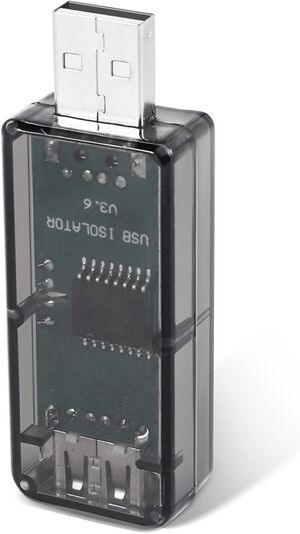Galvanic USB isolator: verschil tussen versies
| (7 tussenliggende versies door 3 gebruikers niet weergegeven) | |||
| Regel 1: | Regel 1: | ||
| − | [[Bestand:Usb-condom.jpg| | + | [[Categorie:Tools]][[Categorie:Electronics tools]] |
| − | [[Bestand:Usb-condom-av.jpg| | + | [[Bestand:Usb-condom.jpg|miniatuur|USB Galvanic Isolator/Separator]] |
| + | [[Bestand:Usb-condom-av.jpg|miniatuur|USB Galvanic Isolator/Separator]] | ||
Most of our nodes are POE powered; but are not galvanically isolated from the LAN (power). | Most of our nodes are POE powered; but are not galvanically isolated from the LAN (power). | ||
| Regel 6: | Regel 7: | ||
It is common (to prevent rust) to run POE at negative voltages; so the 'plus' is somewhat near 0 Volt/earth; and the 'minus' is 40-60Volt below earth. But laptops and other USB devices tend to be wired the other way round. | It is common (to prevent rust) to run POE at negative voltages; so the 'plus' is somewhat near 0 Volt/earth; and the 'minus' is 40-60Volt below earth. But laptops and other USB devices tend to be wired the other way round. | ||
| − | So it is essential to use a [[Galvanic USB isolator|USB condom/ | + | So it is essential to use a [[Galvanic USB isolator|USB condom/galvanic separator]] when it is connected both to Ethernet and USB. |
As otherwise there is a voltage delta of 48 or 2x72V between your devices and earth. | As otherwise there is a voltage delta of 48 or 2x72V between your devices and earth. | ||
| Regel 14: | Regel 15: | ||
They are relatively expensive; and as they are sometimes mandatory safety equipment when high (kilo) voltages are in use (220V is actually still [https://nl.wikipedia.org/wiki/Laagspanning classed as a low voltage]). These easily go vor 150 Euro's and more. | They are relatively expensive; and as they are sometimes mandatory safety equipment when high (kilo) voltages are in use (220V is actually still [https://nl.wikipedia.org/wiki/Laagspanning classed as a low voltage]). These easily go vor 150 Euro's and more. | ||
| − | However there is no need for that level of safety in our case; and as it happens - | + | However there is no need for that level of safety in our case; and as it happens - audiophiles worry about a similar issue; in their case the ground loops cause audio quality issues. So using these USB galvanic isolators (which can be had well under 15 euro) is a [https://www.amazon.nl/Huerous-Adum3160-Digital-Isolator-Digitale/dp/B0CLMBZTCG/ref=sr_1_5?__mk_nl_NL=%C3%85M%C3%85%C5%BD%C3%95%C3%91&crid=18RIQPEZYGYYF&keywords=usb+isolator+audio&qid=1704282532&sprefix=usb+isolator+audio%2Caps%2C76&sr=8-5 perfectly good solution]. |
Huidige versie van 12 nov 2024 om 00:18
Most of our nodes are POE powered; but are not galvanically isolated from the LAN (power).
It is common (to prevent rust) to run POE at negative voltages; so the 'plus' is somewhat near 0 Volt/earth; and the 'minus' is 40-60Volt below earth. But laptops and other USB devices tend to be wired the other way round.
So it is essential to use a USB condom/galvanic separator when it is connected both to Ethernet and USB.
As otherwise there is a voltage delta of 48 or 2x72V between your devices and earth.
No need for expensive ones
They are relatively expensive; and as they are sometimes mandatory safety equipment when high (kilo) voltages are in use (220V is actually still classed as a low voltage). These easily go vor 150 Euro's and more.
However there is no need for that level of safety in our case; and as it happens - audiophiles worry about a similar issue; in their case the ground loops cause audio quality issues. So using these USB galvanic isolators (which can be had well under 15 euro) is a perfectly good solution.

